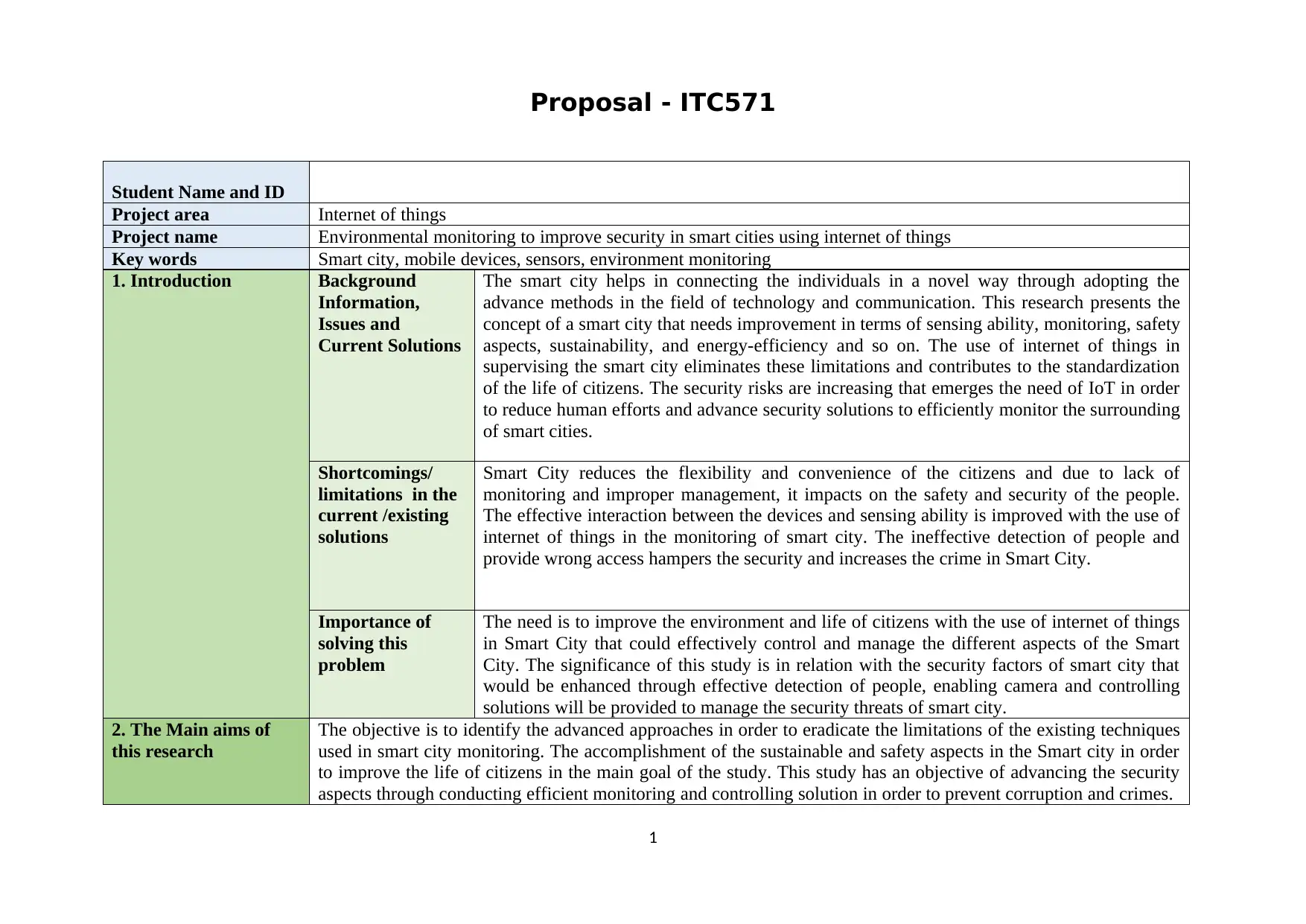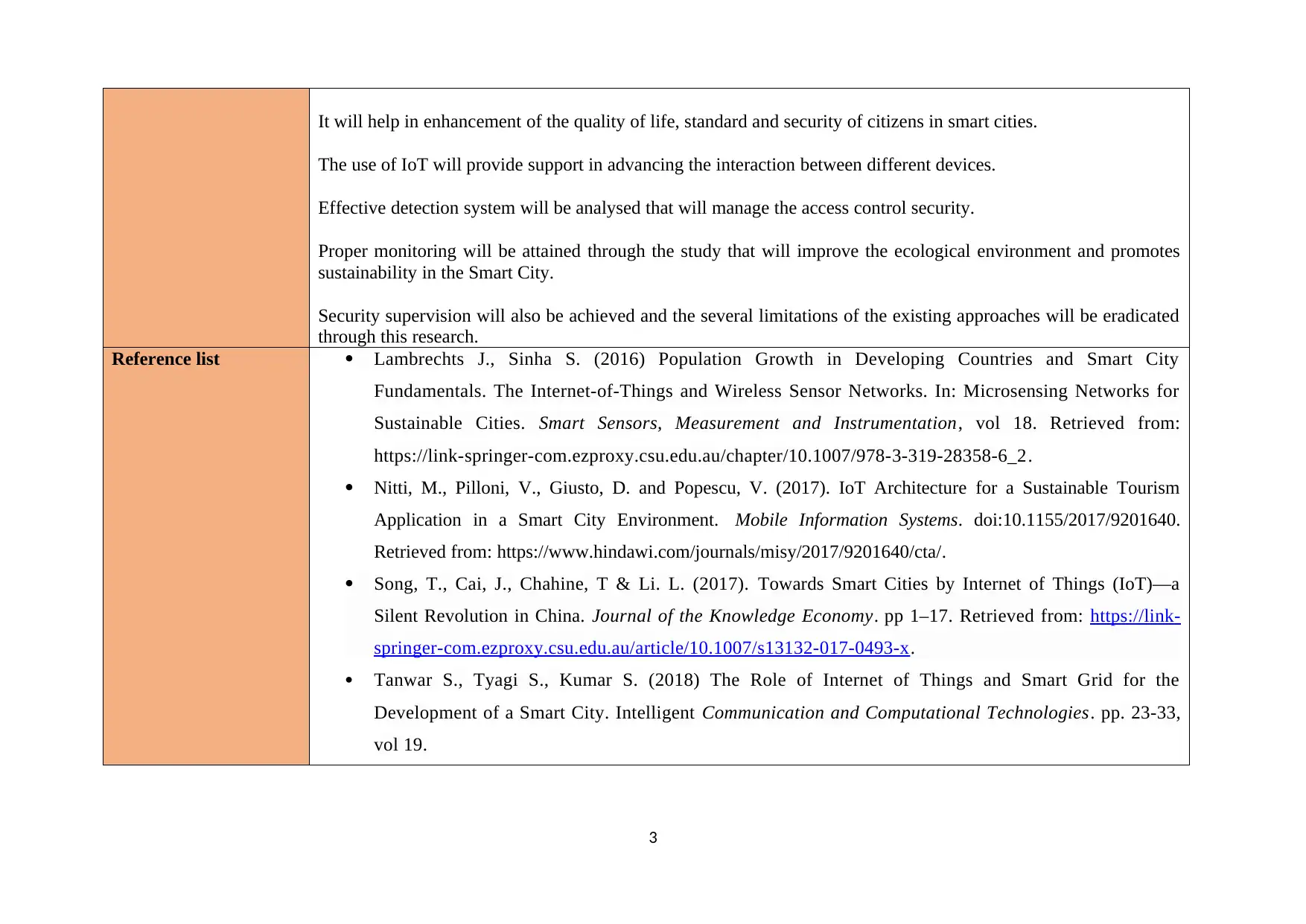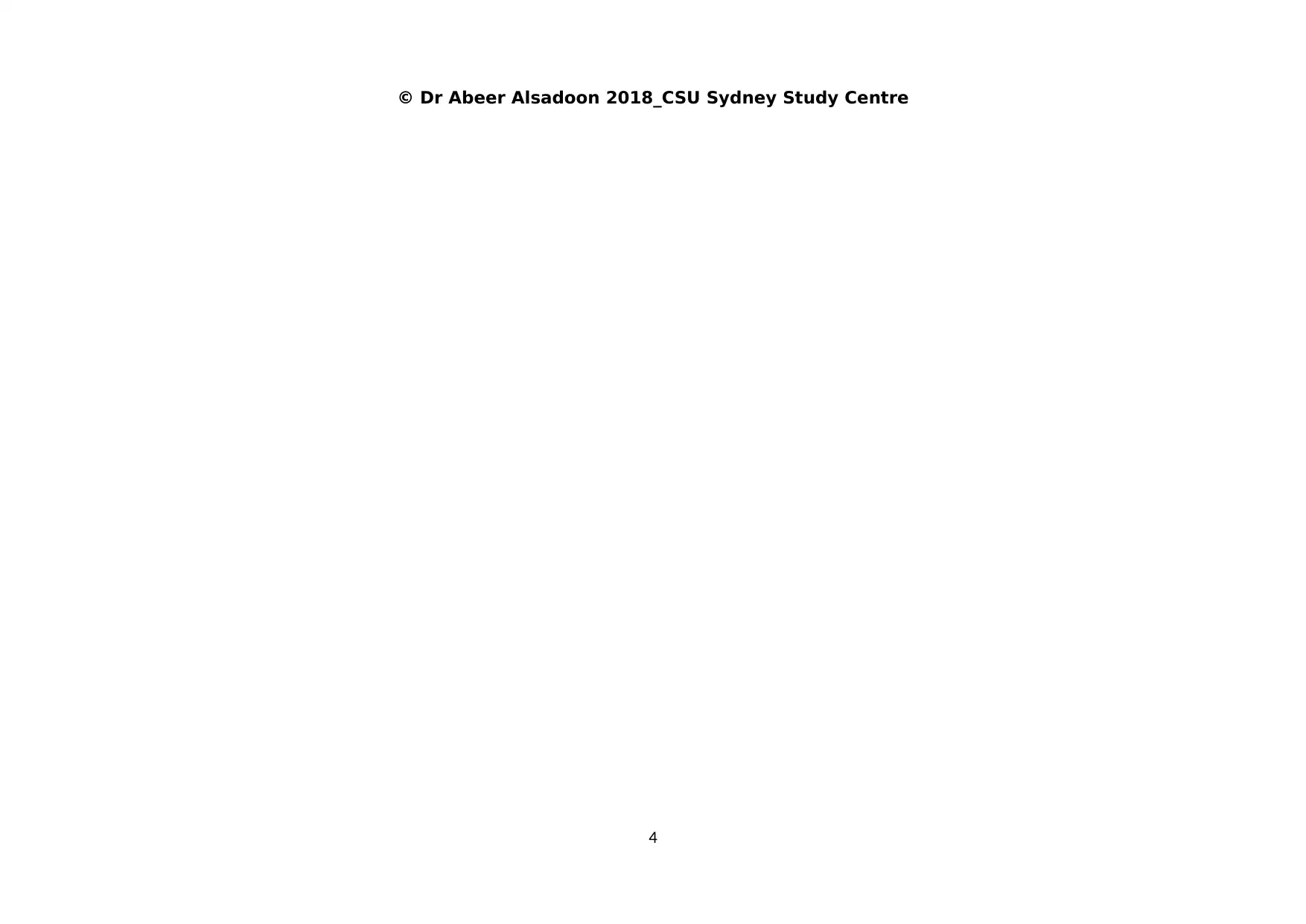ITC571 Project: Enhancing Smart City Security via IoT Monitoring
VerifiedAdded on 2024/05/16
|4
|1130
|349
Report
AI Summary
This document presents a project proposal (ITC571) focused on leveraging the Internet of Things (IoT) for enhancing security in smart cities through environmental monitoring. It identifies the shortcomings of current smart city solutions, particularly concerning sensing ability, monitoring, safety, and sustainability. The proposal aims to address these limitations by integrating IoT devices for improved environmental monitoring, effective detection of people, and enhanced access control, ultimately reducing security risks and improving the quality of life for citizens. The research questions explore the significance of environmental monitoring, methods for improving security with IoT, the impact of inadequate supervision, and strategies for achieving sustainability. The proposed methodology involves data collection from reputable sources, analysis of existing technologies, and the development of modifications and enhancements to existing solutions. The expected outcomes include improved quality of life, enhanced device interaction, effective detection systems, and better ecological environment.

Proposal - ITC571
Student Name and ID
Project area Internet of things
Project name Environmental monitoring to improve security in smart cities using internet of things
Key words Smart city, mobile devices, sensors, environment monitoring
1. Introduction Background
Information,
Issues and
Current Solutions
The smart city helps in connecting the individuals in a novel way through adopting the
advance methods in the field of technology and communication. This research presents the
concept of a smart city that needs improvement in terms of sensing ability, monitoring, safety
aspects, sustainability, and energy-efficiency and so on. The use of internet of things in
supervising the smart city eliminates these limitations and contributes to the standardization
of the life of citizens. The security risks are increasing that emerges the need of IoT in order
to reduce human efforts and advance security solutions to efficiently monitor the surrounding
of smart cities.
Shortcomings/
limitations in the
current /existing
solutions
Smart City reduces the flexibility and convenience of the citizens and due to lack of
monitoring and improper management, it impacts on the safety and security of the people.
The effective interaction between the devices and sensing ability is improved with the use of
internet of things in the monitoring of smart city. The ineffective detection of people and
provide wrong access hampers the security and increases the crime in Smart City.
Importance of
solving this
problem
The need is to improve the environment and life of citizens with the use of internet of things
in Smart City that could effectively control and manage the different aspects of the Smart
City. The significance of this study is in relation with the security factors of smart city that
would be enhanced through effective detection of people, enabling camera and controlling
solutions will be provided to manage the security threats of smart city.
2. The Main aims of
this research
The objective is to identify the advanced approaches in order to eradicate the limitations of the existing techniques
used in smart city monitoring. The accomplishment of the sustainable and safety aspects in the Smart city in order
to improve the life of citizens in the main goal of the study. This study has an objective of advancing the security
aspects through conducting efficient monitoring and controlling solution in order to prevent corruption and crimes.
1
Student Name and ID
Project area Internet of things
Project name Environmental monitoring to improve security in smart cities using internet of things
Key words Smart city, mobile devices, sensors, environment monitoring
1. Introduction Background
Information,
Issues and
Current Solutions
The smart city helps in connecting the individuals in a novel way through adopting the
advance methods in the field of technology and communication. This research presents the
concept of a smart city that needs improvement in terms of sensing ability, monitoring, safety
aspects, sustainability, and energy-efficiency and so on. The use of internet of things in
supervising the smart city eliminates these limitations and contributes to the standardization
of the life of citizens. The security risks are increasing that emerges the need of IoT in order
to reduce human efforts and advance security solutions to efficiently monitor the surrounding
of smart cities.
Shortcomings/
limitations in the
current /existing
solutions
Smart City reduces the flexibility and convenience of the citizens and due to lack of
monitoring and improper management, it impacts on the safety and security of the people.
The effective interaction between the devices and sensing ability is improved with the use of
internet of things in the monitoring of smart city. The ineffective detection of people and
provide wrong access hampers the security and increases the crime in Smart City.
Importance of
solving this
problem
The need is to improve the environment and life of citizens with the use of internet of things
in Smart City that could effectively control and manage the different aspects of the Smart
City. The significance of this study is in relation with the security factors of smart city that
would be enhanced through effective detection of people, enabling camera and controlling
solutions will be provided to manage the security threats of smart city.
2. The Main aims of
this research
The objective is to identify the advanced approaches in order to eradicate the limitations of the existing techniques
used in smart city monitoring. The accomplishment of the sustainable and safety aspects in the Smart city in order
to improve the life of citizens in the main goal of the study. This study has an objective of advancing the security
aspects through conducting efficient monitoring and controlling solution in order to prevent corruption and crimes.
1
Paraphrase This Document
Need a fresh take? Get an instant paraphrase of this document with our AI Paraphraser

3. The questions which
need to be addressed in
this research
Questions that need to be addressed are as follows:
RQ1: What is the significance of monitoring of environment of Smart City?
RQ2: How the security aspects could be improved with the use of internet of things in Smart City?
RQ3: How the life of the citizens is affecting due to the lack of supervision of Smart City?
RQ4: Illustrate the ways to attain sustainability in the smart city.
RQ5: How can citizens get benefits fromthe enhanced interaction of devices?
RQ6: What are the solutions available in managing security risks of Smart City?
4. A Brief Description
of YourProposal
The existing solution has different pitfalls like lack of monitoring of the environment, lack of safety aspects,
ineffective interaction with devices and security problems. Sustainability is also not achieved that affect the quality
of life of citizens. This research concentrates on efficient monitoring of smart city with intention to improve the
life, standard and security of citizens with the use of internet of things like the mobile application, energy-efficient
devices, effective detection approaches and more.
5. Factors affecting the
research and ethical
considerations (if
needed)
There are different social, economic, ethical and legal factors that influence on this study. It will not hurt the
feeling of any individual and it will take care of the legislation while conducting this research. The data collected
for this research is to be collected from valid and relevant resources and this study is not breaching any kind of
laws or regulations.
6. The Process
orMethodology of Your
Project
i. The data is to be collected from the renowned sources like ProQuest, Springer, etc from the CSU library
and IEEE papers.
ii. The collected information is to be then analysed and the different systems and technologies will be
evaluated that monitors the surrounding of the smart city with the use of internet of things.
iii. The strengths and weaknesses will be assessed and in order to improve the solution through making
modifications and enhancement in it.
iv. Suggestions will be provided with the intention to efficiently monitor the surrounding, improve the security
of smart city and completely eradicates the pitfalls of current solutions.
7. Expected Outcomes The expected outcome of the research is provided below:
2
need to be addressed in
this research
Questions that need to be addressed are as follows:
RQ1: What is the significance of monitoring of environment of Smart City?
RQ2: How the security aspects could be improved with the use of internet of things in Smart City?
RQ3: How the life of the citizens is affecting due to the lack of supervision of Smart City?
RQ4: Illustrate the ways to attain sustainability in the smart city.
RQ5: How can citizens get benefits fromthe enhanced interaction of devices?
RQ6: What are the solutions available in managing security risks of Smart City?
4. A Brief Description
of YourProposal
The existing solution has different pitfalls like lack of monitoring of the environment, lack of safety aspects,
ineffective interaction with devices and security problems. Sustainability is also not achieved that affect the quality
of life of citizens. This research concentrates on efficient monitoring of smart city with intention to improve the
life, standard and security of citizens with the use of internet of things like the mobile application, energy-efficient
devices, effective detection approaches and more.
5. Factors affecting the
research and ethical
considerations (if
needed)
There are different social, economic, ethical and legal factors that influence on this study. It will not hurt the
feeling of any individual and it will take care of the legislation while conducting this research. The data collected
for this research is to be collected from valid and relevant resources and this study is not breaching any kind of
laws or regulations.
6. The Process
orMethodology of Your
Project
i. The data is to be collected from the renowned sources like ProQuest, Springer, etc from the CSU library
and IEEE papers.
ii. The collected information is to be then analysed and the different systems and technologies will be
evaluated that monitors the surrounding of the smart city with the use of internet of things.
iii. The strengths and weaknesses will be assessed and in order to improve the solution through making
modifications and enhancement in it.
iv. Suggestions will be provided with the intention to efficiently monitor the surrounding, improve the security
of smart city and completely eradicates the pitfalls of current solutions.
7. Expected Outcomes The expected outcome of the research is provided below:
2

It will help in enhancement of the quality of life, standard and security of citizens in smart cities.
The use of IoT will provide support in advancing the interaction between different devices.
Effective detection system will be analysed that will manage the access control security.
Proper monitoring will be attained through the study that will improve the ecological environment and promotes
sustainability in the Smart City.
Security supervision will also be achieved and the several limitations of the existing approaches will be eradicated
through this research.
Reference list Lambrechts J., Sinha S. (2016) Population Growth in Developing Countries and Smart City
Fundamentals. The Internet-of-Things and Wireless Sensor Networks. In: Microsensing Networks for
Sustainable Cities. Smart Sensors, Measurement and Instrumentation, vol 18. Retrieved from:
https://link-springer-com.ezproxy.csu.edu.au/chapter/10.1007/978-3-319-28358-6_2.
Nitti, M., Pilloni, V., Giusto, D. and Popescu, V. (2017). IoT Architecture for a Sustainable Tourism
Application in a Smart City Environment. Mobile Information Systems. doi:10.1155/2017/9201640.
Retrieved from: https://www.hindawi.com/journals/misy/2017/9201640/cta/.
Song, T., Cai, J., Chahine, T & Li. L. (2017). Towards Smart Cities by Internet of Things (IoT)—a
Silent Revolution in China. Journal of the Knowledge Economy. pp 1–17. Retrieved from: https://link-
springer-com.ezproxy.csu.edu.au/article/10.1007/s13132-017-0493-x.
Tanwar S., Tyagi S., Kumar S. (2018) The Role of Internet of Things and Smart Grid for the
Development of a Smart City. Intelligent Communication and Computational Technologies. pp. 23-33,
vol 19.
3
The use of IoT will provide support in advancing the interaction between different devices.
Effective detection system will be analysed that will manage the access control security.
Proper monitoring will be attained through the study that will improve the ecological environment and promotes
sustainability in the Smart City.
Security supervision will also be achieved and the several limitations of the existing approaches will be eradicated
through this research.
Reference list Lambrechts J., Sinha S. (2016) Population Growth in Developing Countries and Smart City
Fundamentals. The Internet-of-Things and Wireless Sensor Networks. In: Microsensing Networks for
Sustainable Cities. Smart Sensors, Measurement and Instrumentation, vol 18. Retrieved from:
https://link-springer-com.ezproxy.csu.edu.au/chapter/10.1007/978-3-319-28358-6_2.
Nitti, M., Pilloni, V., Giusto, D. and Popescu, V. (2017). IoT Architecture for a Sustainable Tourism
Application in a Smart City Environment. Mobile Information Systems. doi:10.1155/2017/9201640.
Retrieved from: https://www.hindawi.com/journals/misy/2017/9201640/cta/.
Song, T., Cai, J., Chahine, T & Li. L. (2017). Towards Smart Cities by Internet of Things (IoT)—a
Silent Revolution in China. Journal of the Knowledge Economy. pp 1–17. Retrieved from: https://link-
springer-com.ezproxy.csu.edu.au/article/10.1007/s13132-017-0493-x.
Tanwar S., Tyagi S., Kumar S. (2018) The Role of Internet of Things and Smart Grid for the
Development of a Smart City. Intelligent Communication and Computational Technologies. pp. 23-33,
vol 19.
3
⊘ This is a preview!⊘
Do you want full access?
Subscribe today to unlock all pages.

Trusted by 1+ million students worldwide

© Dr Abeer Alsadoon 2018_CSU Sydney Study Centre
4
4
1 out of 4
Related Documents
Your All-in-One AI-Powered Toolkit for Academic Success.
+13062052269
info@desklib.com
Available 24*7 on WhatsApp / Email
![[object Object]](/_next/static/media/star-bottom.7253800d.svg)
Unlock your academic potential
Copyright © 2020–2025 A2Z Services. All Rights Reserved. Developed and managed by ZUCOL.




